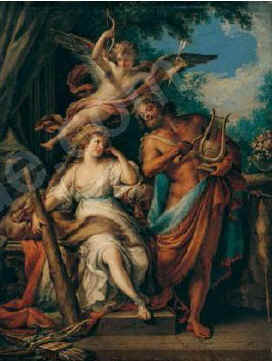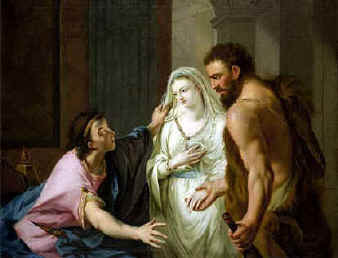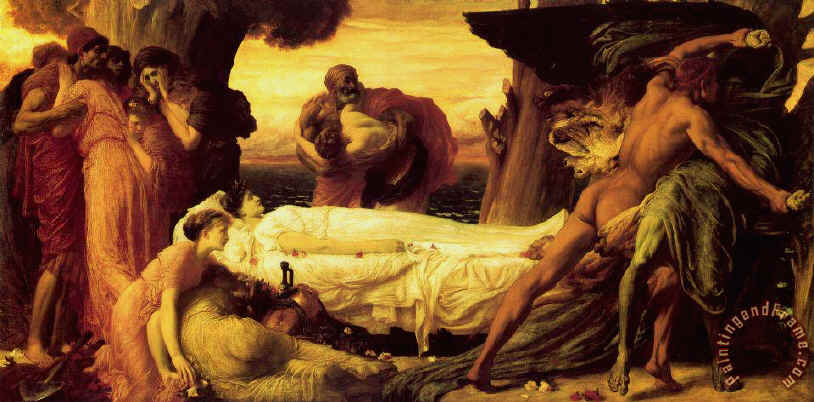The Love story of Admetus
Di
nos quasi pilas homines habent.
The Gods play around with us like toys.
Plautus
|
By Cynthia Vautier
Written in honor of her friend, Laurie
Schiffman
who tirelessly advocated for her husband
Steve Schiffman
who died
August 7, 2016 of prostate cancer.
He had no better friend.
August 27, 2016
 Once upon a time there was a King, in ancient
Greece, named Admetus. He
was married to a woman named Alcestis, who was his beloved.
Admetus had, by his kindness to Apollo, who had come to him
disguised as a beggar, earned a favor. The favor was this: if
he should confront death, he would be given a reprieve, if someone
else would be willing to die in his place.
Why should Admetus worry about confronting death? He had angered one of the gods, and that god had decreed that
Admetus should face an early death.
Once upon a time there was a King, in ancient
Greece, named Admetus. He
was married to a woman named Alcestis, who was his beloved.
Admetus had, by his kindness to Apollo, who had come to him
disguised as a beggar, earned a favor. The favor was this: if
he should confront death, he would be given a reprieve, if someone
else would be willing to die in his place.
Why should Admetus worry about confronting death? He had angered one of the gods, and that god had decreed that
Admetus should face an early death.
One day, without warning, Admetus began to fail.
Normally healthy and hearty, he fell ill. His condition rapidly worsened.
Admetus knew that his condition was the result of the god's
arrow, pointed at his heart, and that he faced death for no reason.
The god had simply decided that it was time to lay claim to the
power that the gods have. But
as he lay dying, he remembered the gift that Apollo had given him, and
that there might be a reprieve.
He sent messengers far and wide in his kingdom,
who asked the king's subjects this:
if, in remembrance of the many favors he had done for his
subjects (for his kindness was renowned), would any one of them be
willing to die in his stead? The
old, the frail, those approaching death themselves, who had but days
or weeks to live, all turned away. They loved their king, but they would not die for him.
Alcestis, hearing this, came to Admetus and said:
"I am going to die in your place." Upon uttering these words, the gift of Apollo took effect, and
there was no turning back. Instantly,
she fell to the floor and had to be carried to her bed. And just as quickly, Admetus felt the flush of health return to
him. He jumped up from
his bed, strong and full of vitality. He rushed to Alcestis' bedside and kissed her pale lips and
stroked her cooling hands. He
begged her to linger, but she could not hear him. If not for a miracle, she would be dead by morning.
Word came to Admetus: he had a guest, who had just arrived.
It was his friend Hercules, who had arrived to visit him. Upon learning of Alcestis' condition, and the reason for it, he
said to Admetus: "I
will lie in wait at Alcestis' bedside tonight, and when Death comes
for her, I will wrestle with him, and if the gods are willing, I will
defeat him."
 So Hercules took his place beside the pale and
unconscious Alcestis, and waited and waited. After midnight, Hercules heard a sound.
A figure that was as fearsome as Terror itself came drifting
toward Hercules, issuing before his cloaks a breath that was so cold
that Hercules himself felt as if all his strength were draining into
the marble beneath his feet.
So Hercules took his place beside the pale and
unconscious Alcestis, and waited and waited. After midnight, Hercules heard a sound.
A figure that was as fearsome as Terror itself came drifting
toward Hercules, issuing before his cloaks a breath that was so cold
that Hercules himself felt as if all his strength were draining into
the marble beneath his feet.
But he stood firm, and laid his strong, warm
hands upon that ghostly figure that sucked the heat out of every
living thing that stood before him. Death slid his cold hands down Hercules' arms, and Hercules
shivered. But he knew
that it was not his powerful muscles that would save him. It was his will that could be his only salvation.
His strength was in his will.
He willed himself to strive against Death, and though he grew
slick with sweat, and colder than he had ever been, he would not give
in. He gripped the
ghostly limbs that were so insubstantial and yet so mighty, and would
not let go.
They wrestled through the night, and though
Hercules' vision became blurred with weakness, he continued to resist.
And then, close to fainting with the enormity of his struggle,
he noticed something. The
horizon, visible through the doors to the room, had begun to lighten.
Hercules fought on. And
he noticed, as he gripped Death's ghostly limbs, that Death's hands
had begun to lose their strength. Hercules tightened his hold, though he gasped for breath.
Minute by minute the sky grew lighter, and
Death's grip grew less and less powerful. And Hercules knew that he had won.
And Hercules knew that Death knew it, too. The ghastly figure broke free, and drifted out the door, and
vanished like smoke.
Hercules turned to Alcestis. Her cheeks had begun to turn pink.
He leaned toward her and felt her breath on his face. He took her hand and felt what he had not felt in either
Alcestis or himself all night: warmth.

 Once upon a time there was a King, in ancient
Greece, named Admetus. He
was married to a woman named Alcestis, who was his beloved.
Admetus had, by his kindness to Apollo, who had come to him
disguised as a beggar, earned a favor. The favor was this: if
he should confront death, he would be given a reprieve, if someone
else would be willing to die in his place.
Why should Admetus worry about confronting death? He had angered one of the gods, and that god had decreed that
Admetus should face an early death.
Once upon a time there was a King, in ancient
Greece, named Admetus. He
was married to a woman named Alcestis, who was his beloved.
Admetus had, by his kindness to Apollo, who had come to him
disguised as a beggar, earned a favor. The favor was this: if
he should confront death, he would be given a reprieve, if someone
else would be willing to die in his place.
Why should Admetus worry about confronting death? He had angered one of the gods, and that god had decreed that
Admetus should face an early death. So Hercules took his place beside the pale and
unconscious Alcestis, and waited and waited. After midnight, Hercules heard a sound.
A figure that was as fearsome as Terror itself came drifting
toward Hercules, issuing before his cloaks a breath that was so cold
that Hercules himself felt as if all his strength were draining into
the marble beneath his feet.
So Hercules took his place beside the pale and
unconscious Alcestis, and waited and waited. After midnight, Hercules heard a sound.
A figure that was as fearsome as Terror itself came drifting
toward Hercules, issuing before his cloaks a breath that was so cold
that Hercules himself felt as if all his strength were draining into
the marble beneath his feet.